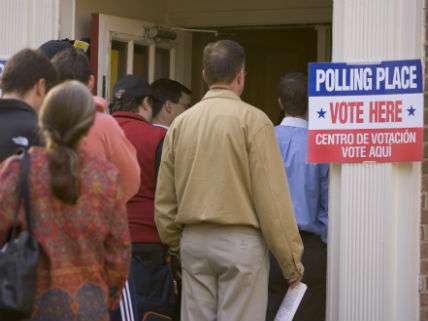Voter ID and Rigged Elections
Voter ID laws are actually an attempt to rig elections

"If the election is rigged, I would not be surprised," Donald Trump told The Washington Post on August 2. "The voter ID situation has turned out to be a very unfair development. We may have people vote 10 times."
Trump was reacting to recent federal court decisions that threw out strict voter identification laws in North Carolina, North Dakota, Texas, and Wisconsin. The main source of contention in the cases had been the requirement that voters show a government-issued photo ID before being permitted to cast their ballots.
Proponents of strict voter ID laws say that they are necessary to prevent voter impersonation, a form of fraud in which individuals cast more than one ballot. Opponents counter that the demand for photo identification is meant to suppress the turnout of minority and poor voters, who are less likely to have such documents. In other words, they say voter ID laws are an attempt to rig elections against those candidates who are more likely to be supported by minorities and poor people.
Voter impersonation fraud appears to be almost non-existent. In the wake of 2000's ballot-counting fiasco, the Help America Vote Act of 2002 created the U.S. Election Assistance Commission to improve voting systems and voter access. In 2007, the commission issued its Election Crimes report, which reviewed what data there was and analyzed numerous anecdotes about voter fraud. The report noted that many experts "asserted that impersonation of voters is probably the least frequent type of fraud because it is the most likely type of fraud to be discovered, there are stiff penalties associated with this type of fraud, and it is an inefficient method of influencing an election." The penalties include $10,000 in fines and up to five years in prison.
The New York Times reported in 2007 that a five-year Department of Justice crackdown on voter fraud had yielded just 86 convictions. In 2014, Justin Levitt, a professor at Loyola Law School, Los Angeles, reported finding just 31 cases of voter impersonation fraud out of 1 billion ballots cast between 2000 and 2014. Politifact calculated in 2015 that you are 13 times more likely to be struck by lightning than to stumble across an instance of in-person voter fraud in Texas. In other words, Trump's allegation is a hallucination.
What happens if you look at the question from the other direction? Do strict voter ID laws significantly skew electoral results? The evidence is mixed.
For example, a 2013 study by Indiana University law professor Michael Pitts looked at the total number of ballots cast in the 2008 and 2012 Indiana primaries. He also counted the total number of provisional ballots cast and the total number of provisional ballots counted. Ultimately, Pitts finds that provisional ballots resulting from ID problems amounted to a minuscule 0.026 and 0.012 percent of all ballots cast in the 2012 and 2008 primaries respectively.
"With the lack of evidence of actual instances of in-person voter fraud, it's quite possible that even though the actual disfranchisement caused by photo identification on the overall electorate is slight, the actual disfranchisement is vastly higher than the amount of in-person voter fraud that would occur," Pitts argues. "From this perspective, one could easily conclude that a photo identification law does much more harm than good."
By triggering grassroots anger, strict voter ID requirements may actually mobilize voters among the ethnic and demographic groups allegedly targeted by the new rules, according to a 2016 study in Political Psychology. This argument is bolstered by a 2007 University of Missouri study that found that Indiana's photo ID laws appear to have actually increased Democratic turnout by 2 percent in the 2006 election. Two University of Georgia political scientists estimated in their 2012 analysis that state's new stricter voter ID laws did reduce turnout in the 2008 election by 0.4 percent. But they also reported that they could "find no empirical evidence to suggest that there is a racial or ethnic component to this suppression effect."
Earlier this year, a working paper by some political scientists at Bucknell University and the University of California, San Diego, challenged the weak consensus that strict voter ID requirements do not appear to have significant disenfranchising effects. Trying to account for all sorts of demographic, partisan, ideological, and ethnic variables, the researchers examined what happened to voting patterns before and after states adopted strict voter ID requirements. Their analysis focused on individual voter turnout data from 2006 to 2014 derived from the Cooperative Congressional Election Study.
The researchers find that "Hispanic turnout is 7.1 points lower in strict voter ID states than it is in other states in general elections and 5.3 points lower in primary elections. For Blacks, the gap is negligible in general elections but a full 4.6 points in primaries. For Asian Americans the difference is 5.4 points and 6.2 points."
When they take partisan and ideological differences into account, they estimate that Democratic turnout drops by 8.8 percentage points in general elections and even Republican turnout drops by 3.6 points. Interestingly, strict photo ID requirements result in a drop in turnout for strong liberals of 7.9 percentage points, but among strong conservatives turnout increases by 4.8 percentage points. "Strict voter ID laws appear to diminish the participation of Democrats and those on the left, while doing little to deter the vote of Republicans and those on the right," they observe.
It is not a coincidence that all but one of the stricter voter ID laws have been adopted by states in which the legislatures are dominated by Republicans and signed by Republican governors. Stricter voter ID laws don't prevent election rigging; they are instead an attempt at election rigging. Trump is a nominal Republican, so it is not a surprise that he favors laws that he believes will rig the election his way.


Show Comments (299)